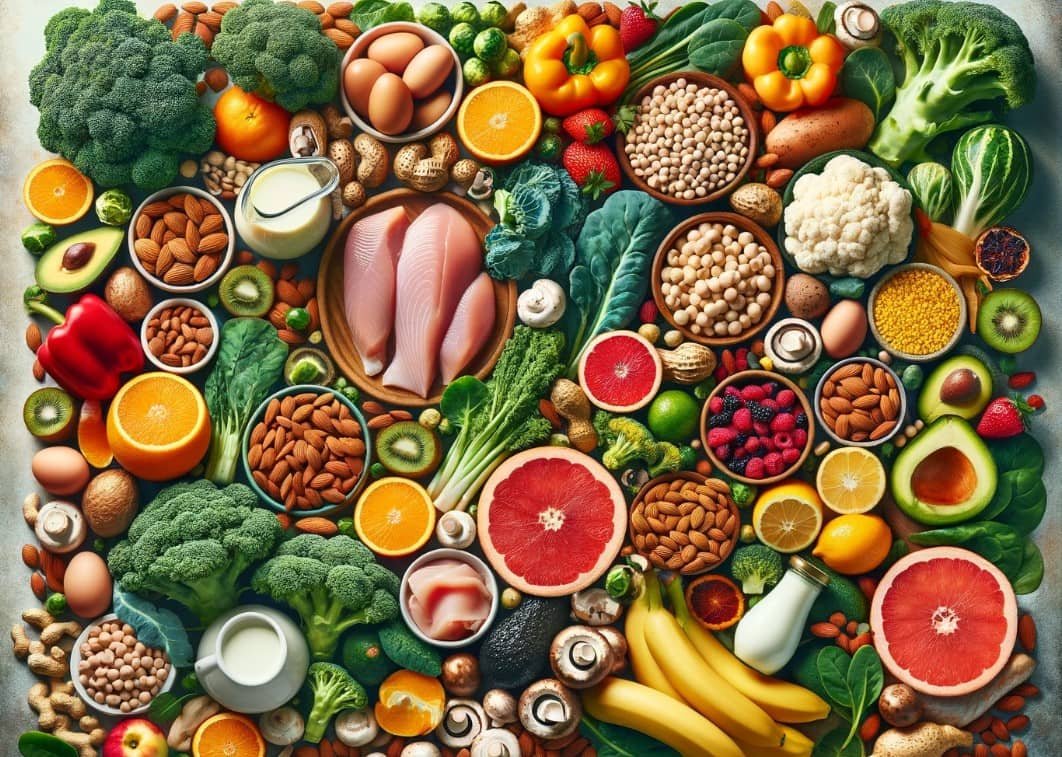Best vitamins for blood circulation in legs and feet: In the quest for maintaining optimal health, the significance of efficient blood circulation, particularly in our legs and feet, cannot be overstated. Proper circulation ensures that our organs receive the necessary oxygen and nutrients, directly influencing our overall well-being.
Table of Contents
Optimizing Circulation: Natural Solutions for Your Legs and Feet
In our increasingly sedentary lifestyles, characterized by prolonged sitting and minimal physical activity, the risk of circulation issues in these areas is markedly heightened.
Natural solutions
Addressing this, nature offers a bounty of solutions through vitamins essential for vascular health. Including a variety of these vitamins in our diet can play a pivotal role in enhancing blood flow and preventing circulation-related complications. This article delves into key vitamins, including the often overlooked Vitamin D, highlighting their importance and natural food sources that are readily available.
Vitamin K: Strengthening Blood Vessels Naturally
Harnessing the Power of Vitamin K for Enhanced Circulation
Vitamin K stands as a crucial component in maintaining proper blood circulation, particularly in the legs and feet. Beyond its well-known role in blood clotting, Vitamin K is instrumental in strengthening blood vessels, thereby facilitating smoother blood flow and reducing the risk of circulatory blockages.
This vitamin is abundantly found in leafy green vegetables like kale and spinach, which are not only easy to incorporate into daily diets but also offer a plethora of other health benefits. Additionally, other excellent sources include broccoli and Brussels sprouts, making Vitamin K both accessible and versatile in various culinary uses. Regular consumption of these vegetables can significantly contribute to improved vascular health and overall well-being.
Vitamin K: Strengthening Blood Vessels Naturally
- Spinach
- Kale
- Broccoli
- Brussels Sprouts
- Green Leaf Lettuce
Niacin (Vitamin B3): Dual Benefits for Circulation and Cholesterol
The Essential Role of Niacin in Vascular Health
Niacin, also known as Vitamin B3, plays a dual role in supporting healthy circulation. It not only aids in managing cholesterol levels, thereby preventing the narrowing of blood vessels, but also assists in dilating blood vessels for improved blood flow. This makes Niacin a vital nutrient for maintaining good circulation in the legs and feet.
Rich sources of Niacin include poultry like turkey and chicken breast, offering a simple addition to many meals. For vegetarians, peanuts and mushrooms are excellent sources, ensuring that everyone can benefit from this essential vitamin. Regular inclusion of these Niacin-rich foods in your diet can support vascular health and contribute to better overall circulation.
Niacin (Vitamin B3)
- Turkey
- Chicken Breast
- Peanuts
- Mushrooms
- Green Peas
Vitamin E: Enhancing Blood Flow and Vascular Health
Crucial Role in Circulatory Wellness
Vitamin E is renowned not just for its skin-enhancing properties but also for its significant role in improving blood circulation. This vitamin aids in preventing the clumping of blood cells and platelets, a key factor in maintaining smooth blood flow through veins and arteries. Its antioxidant properties further contribute to the health of blood vessels, reducing the risk of blockages and circulatory issues.
Almonds and sunflower seeds are prime sources of Vitamin E, making them perfect for snacks or additions to various dishes. Avocados and spinach also offer high levels of this vitamin, providing delicious and versatile options for incorporating Vitamin E into daily diets. Regular consumption of these foods can lead to healthier veins and an overall enhanced circulatory system.
Vitamin E
- Almonds
- Sunflower Seeds
- Avocados
- Spinach
- Swiss Chard
Vitamin B6: Antioxidant Power for Healthy Veins and Arteries
The Protective Influence of Vitamin B6 on Circulation
Vitamin B6, a member of the B-complex vitamins, plays a pivotal role in protecting our vascular system. It combats free radicals, which are known to contribute to the hardening and narrowing of veins and arteries, a major concern for circulatory health, especially in the legs and feet.
This vitamin is naturally present in a variety of foods, offering easy inclusion in our daily diets. Bananas, a versatile and widely loved fruit, are an excellent source of Vitamin B6. For those seeking protein-rich sources, tuna and salmon not only provide this essential vitamin but also offer heart-healthy omega-3 fatty acids. Additionally, chickpeas serve as a nutritious plant-based option, perfect for diverse dietary preferences. Incorporating these foods into your meals can significantly bolster your vascular health, aiding in maintaining robust blood circulation.
Vitamin B6
- Bananas
- Chickpeas
- Tuna
- Salmon
- Sweet Potatoes
Vitamin B12: Essential for DNA Repair and Blood Clot Prevention
Role in Promoting Healthy Circulation
Vitamin B12 is essential not only for the repair and production of DNA but also plays a crucial role in regulating homocysteine levels in the blood. Elevated homocysteine is associated with an increased risk of blood clots, making B12 vital for maintaining smooth circulation in the legs and feet.
Dietary sources of Vitamin B12 are predominantly found in animal products. Dairy products and eggs offer a convenient way to incorporate B12 into your diet. For vegetarians, fortified cereals can be a valuable source of this vitamin. Certain individuals, particularly those with absorption disorders, may require supplements to avoid deficiency. Regular intake of B12-rich foods helps ensure a balanced circulatory system, aiding in the prevention of clot-related issues.
Vitamin B12
- Dairy Products
- Eggs
- Fortified Cereals
- Beef
- Chicken
Vitamin C: Boosting Immune System and Circulatory Health
The Dual Role of Vitamin C in Wellness and Blood Flow
Vitamin C is widely celebrated for its ability to bolster the immune system, but its role in enhancing blood circulation is equally vital. This powerful antioxidant aids in the strengthening of blood vessel walls, ensuring efficient blood flow, particularly in the legs and feet. It also helps in preventing the hardening of arteries, a key factor in maintaining optimal circulatory health.
Citrus fruits, such as oranges and lemons, are famously rich in Vitamin C. Other excellent sources include strawberries and kiwi, offering a sweet yet healthful addition to any diet. Bell peppers, both a flavorful and colorful vegetable, also provide a substantial amount of Vitamin C. Incorporating these fruits and vegetables into your daily meals can significantly contribute to improved blood circulation and overall health.
Vitamin C
- Oranges
- Strawberries
- Kiwi
- Bell Peppers
- Guavas
Vitamin D: Vital for Vascular Health and Calcium Absorption
Sunshine Vitamin: A Key Player in Circulatory Efficiency
Vitamin D, often termed the ‘sunshine vitamin’, is increasingly recognized for its importance in vascular health. It plays a crucial role in the absorption of calcium, essential for the health and elasticity of blood vessels. Adequate Vitamin D levels are associated with a reduced risk of vascular problems, which is particularly important for the circulation in legs and feet.
The most natural source of Vitamin D is sunlight exposure, which stimulates the body to produce this vital nutrient. For dietary sources, fatty fish like salmon and mackerel are rich in Vitamin D. Additionally, fortified dairy products and certain cereals can also help meet the daily Vitamin D requirements, especially in regions with limited sunlight. Regularly including these sources in your lifestyle ensures not only strong bones but also a robust circulatory system.
Vitamin D
- Salmon
- Mackerel
- Fortified Dairy Products
- Fortified Cereals
- Egg Yolks
Best vitamins for blood circulation in legs and feet – Summary Table
| Vitamin | Top 5 Natural Sources |
|---|---|
| K | Kale, Spinach, Broccoli, Brussels Sprouts, Green Leaf Lettuce |
| B3 | Turkey, Chicken Breast, Peanuts, Mushrooms, Green Peas |
| E | Almonds, Sunflower Seeds, Avocados, Spinach, Swiss Chard |
| B6 | Bananas, Chickpeas, Tuna, Salmon, Sweet Potatoes |
| B12 | Dairy Products, Eggs, Fortified Cereals, Beef, Chicken |
| C | Oranges, Strawberries, Kiwi, Bell Peppers, Guavas |
| D | Salmon, Mackerel, Fortified Dairy Products, Fortified Cereals, Egg Yolks |
This table provides a clear and concise summary of natural food sources rich in each vitamin, aiding in dietary planning for improved circulation
Conclusion: Best vitamins for blood circulation in legs and feet
Integrating Vital Vitamins for Optimal Blood Flow
The journey to maintaining excellent blood circulation in the legs and feet is multifaceted, yet attainable through a balanced diet rich in specific vitamins. Vitamin K, Niacin, Vitamin E, Vitamin B6, Vitamin B12, Vitamin C, and Vitamin D each play unique and essential roles in promoting vascular health.
Incorporating a variety of fruits, vegetables, and other natural food sources of these vitamins into your daily diet can significantly enhance blood flow and prevent circulation-related issues. Remember, while a nutrient-rich diet is key, it’s always advisable to consult with a healthcare professional for personalized dietary advice, especially in cases of existing health conditions or nutrient deficiencies. Embrace these natural solutions and step towards improved circulation and overall wellness.
This concludes the article for wellnesstips24.com on Best Vitamins for Blood Circulation in Legs and Feet.





